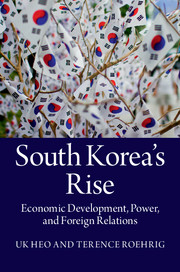Book contents
- Frontmatter
- Dedication
- Contents
- List of figures
- List of tables
- Acknowledgements
- 1 Introduction
- 2 Economic development, state power, and foreign policy
- 3 Inter-Korean relations: confrontation, economic exchanges, and the nuclear crisis
- 4 South Korea and the United States: from dependency to partnership
- 5 South Korea, Russia, and China: from adversaries to economic partners
- 6 South Korea and Japan: an ambivalent relationship
- 7 South Korea and the European Union: evolving cooperation and competition
- 8 South Korea and India: opportunities and obstacles
- 9 South Korea and the developing world: Africa, Latin America, the Middle East, and Southeast Asia
- 10 Contributing to the international community: from consumer to producer
- 11 Conclusion
- Bibliography
- Index
- References
10 - Contributing to the international community: from consumer to producer
Published online by Cambridge University Press: 05 July 2014
- Frontmatter
- Dedication
- Contents
- List of figures
- List of tables
- Acknowledgements
- 1 Introduction
- 2 Economic development, state power, and foreign policy
- 3 Inter-Korean relations: confrontation, economic exchanges, and the nuclear crisis
- 4 South Korea and the United States: from dependency to partnership
- 5 South Korea, Russia, and China: from adversaries to economic partners
- 6 South Korea and Japan: an ambivalent relationship
- 7 South Korea and the European Union: evolving cooperation and competition
- 8 South Korea and India: opportunities and obstacles
- 9 South Korea and the developing world: Africa, Latin America, the Middle East, and Southeast Asia
- 10 Contributing to the international community: from consumer to producer
- 11 Conclusion
- Bibliography
- Index
- References
Summary
In addition to its many important bilateral relationships, South Korean power has also grown in its involvement and influence in international organizations and multilateral cooperation. As South Korea has grown, so too have the interests that it has at stake in multilateral venues as well as the tools to achieve its goals in these forums. Moreover, South Korean economic growth, aided over the years by large amounts of international assistance, created a sense of responsibility among its leaders and the public to play a larger role in maintaining international peace and security. In a 2011 address before the UN General Assembly, President Lee Myung-bak maintained:
Now, the Republic of Korea wants to give back to the international community even more than what it has ever received. The Republic of Korea stands ready to extend a helping hand to those who are in need, providing them with appropriate support and care. We are keen to closely cooperate with the UN and to play a constructive role in combating various challenges the international community faces.
The South Korean government is thus involved in numerous multilateral organizations and is determined to be a leader in UN Peacekeeping Operations (PKO). Currently, Seoul participates in 8 UN PKOs along with several other multilateral operations to bring security and development to troubled domains. South Korea also became a member of the OECD’s Development Assistance Committee (DAC) in 2010 to help less developed countries reduce poverty and assist development.
The story of South Korea transforming itself from an aid recipient to a donor shows how economic success can lead to increased international involvement and influence in international organizations. This chapter examines South Korea’s increasing involvement and influence in global multilateral institutions and the role its economic development played in these efforts by examining three specific areas: contributions to foreign aid and development assistance; involvement in the United Nations and international peacekeeping operations; and participation in Combined Task Force (CTF) 151, the multilateral counter-piracy operation in the Gulf of Aden.
- Type
- Chapter
- Information
- South Korea's RiseEconomic Development, Power, and Foreign Relations, pp. 166 - 182Publisher: Cambridge University PressPrint publication year: 2014



